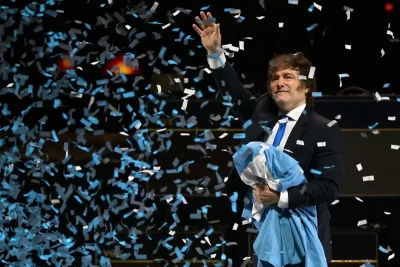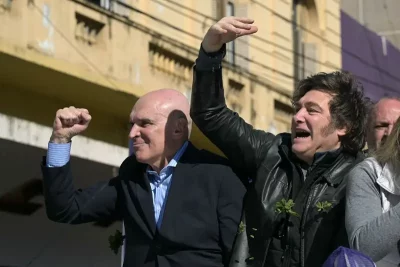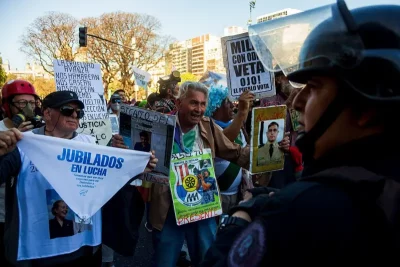
Javier Milei performed Argentine rock classics to try to ‘recover the mystique’
Dressed in a black leather jacket, Argentine president Javier Milei sang songs by Charly García and Los Ratones Paranoicos in front of thousands of people. He jumped, raised his arms on a stage amid fireworks and ended by saying: “I’m going to take a shower and dress like the president.”
Argentina has a long history of rock concerts for all tastes, but the one performed on Monday night (06/10) by the president was different: a political act with uncertain effects.
The show took place in a small stadium in Buenos Aires as the country faces serious economic challenges and several scandals affect the rocker president’s government.
The most recent of these controversial cases was the resignation, on Sunday, of the government candidate for deputy for Buenos Aires, José Luis Espert, due to alleged links with a businessman accused of drug trafficking in the United States.
The episode takes place at a time when Milei’s government is seeking direct financial assistance from the USA before the legislative elections on the 26th of this month, in which it is trying to expand its base in a Congress that has already imposed several setbacks on it.
That’s why the show presented by Milei this week is considered something unusual, even by experts.
“For Argentina, at this very difficult time, (…) it does not seem to follow the standards of how a national policy should be conducted”, said Lara Goyburu, an Argentine political scientist who runs the consultancy company Management & Fit, to BBC News Mundo (BBC Spanish service).
But what was the libertarian president looking for with an act of this magnitude?
‘It was strange’
The show served as a preview for the launch of his book The Construction of the Miracle (The Construction of the Miracle, in free translation), which brings together personal essays and notes about the beginning of his government, in December 2023.
The presidential show included fireworks | AFP
In fact, after singing and then dressing “like president” in a suit and tie, Milei returned to the stage to convey several political messages.
He recalled the beginning of his political career a few years earlier, highlighted some of his government’s achievements, such as reducing poverty, and asked for confidence that he will be able to “put an end to inflation” in the country.
There were also messages during the show he did with the Banda Presidencial, of which he is a member along with other members of his party, La Libertad Avanza, performing Argentine rock classics.
During the show, the president also attacked the opposition. He referred to the Kirchnerist movement, led by former president Cristina Kirchner, with a message: “They won a round, but not the battle.”
Last month, La Libertad Avanza suffered its worst electoral defeat, losing to the Peronist opposition in the legislative elections in the province of Buenos Aires, the most populous in the country.
Since then, the government has faced new challenges.
 After the show, Milei wore the “presidential” suit | AFP
After the show, Milei wore the “presidential” suit | AFP
Argentina’s financial and monetary difficulties led US President Donald Trump to offer US Treasury support to ally Milei.
The Argentine Economy Minister, Luis Caputo, was in Washington on Monday (06/10) to negotiate the financial assistance package, which is still undefined. Therefore, he did not participate in the political-musical event in Buenos Aires.
Also absent was José Luis Espert, who resigned the day before from his main candidacy for government deputy after suspicions of having received financing from Federico “Fred” Machado, a businessman whose extradition to the USA, on drug trafficking charges, was approved on Tuesday (10/07) by the Argentine Judiciary and Executive powers.
The episode adds to the leak of audio from a former director of the National Agency for Disability (Andis, in its Spanish acronym), which suggests the payment of bribes to Karina Milei, the president’s sister and general secretary of the Presidency.
Earlier this year, Milei himself was cited in another controversy when promoting the $Libra cryptocurrency, investigated by the courts as a possible fraud scheme. He denies having committed any wrongdoing.
 José Luis Espert was a key ally of Milei until he resigned his candidacy for deputy this week amid a scandal | AFP
José Luis Espert was a key ally of Milei until he resigned his candidacy for deputy this week amid a scandal | AFP
Corruption began to lead, in August and September, the mentions in surveys by the consultancy Management & Fit on the problems that most affect Argentines, surpassing insecurity and inflation.
“In addition to discontent with the current situation, distrust is beginning to emerge about future improvements,” says Goyburu, political analyst at Management & Fit.
According to Goyburu, Milei sought with the unusual musical act to “recover the mystique” that mobilized his electoral base in 2023, especially among young people who see him as distant from the traditional political class.
“Faced with the flight of moderate voters, we sought to reinforce the hard core”, he explains. “It was something unusual, disruptive and innovative for national political practice, without a doubt. But this is how Milei has shown himself as a figure in Argentine public life, and he has managed to get here.”
For Goyburu, “it is unknown what could happen after the elections on the 26th”.
‘Return to Planet Earth’
Experts say that, with the show, Milei ran the risk of alienating even more sectors of the population who never voted for him or who only supported him in the 2023 second round.
The presidential show received criticism from opponents and even politicians who had a close relationship with Milei in the past, such as former Economy Minister Ricardo López Murphy.
“Go back to planet Earth, president. The country needs you here,” wrote Murphy, currently a deputy, on the social network X (formerly Twitter). “The images convey a mixture of embarrassment, anger and pain.”
 Growing social discontent could complicate Milei’s administration, analysts say | Getty Images
Growing social discontent could complicate Milei’s administration, analysts say | Getty Images
Marina Acosta, doctor in social sciences and responsible for communications at the Argentine consultancy Analogías, states that Milei’s government is going through “its worst moment”, with a drop in management’s approval ratings and the president’s image.
A sign of this is a recent survey by Bloomberg/AtlasIntel, carried out between the 10th and 14th of September: 53.7% of those interviewed said they “disapprove” of the Argentine president, while 42.4% said they “approve” of him. The remainder (3.8%) do not know.
This is Milei’s worst evaluation since he took office. Regarding the government, in the same survey, 49.5% of respondents define it as “bad or very bad” while 33.4% consider it “good or excellent”.
Analyst Shila Vilker, from the research and public opinion company Trespuntozero, says that in the two months before the legislative elections in the province of Buenos Aires, support for the government and President Milei fell by around 10 percentage points, reaching 39.9%.
Last year, these percentages were between 50% and 52%.
According to Acosta, Milei promised to adjust the political “caste”, fight corruption and improve the economy, but many Argentines realize that the adjustment falls on the general population. Furthermore, new scandals emerged and the price of the dollar rose again.
“The government faces a serious problem: it has run out of flags to defend,” Acosta told BBC News Mundo. “The act sought to reaffirm the identity of a space that has few results to show the population.”
Concerns beyond inflation
According to analyst Shila Vilker, from the research and public opinion company Trespuntozero, Argentines’ perception of the economy played a role in the recent drop in Milei’s popularity.
Official data show that the economy has shown signs of stagnation and some experts are speculating about the risk of recession — which Milei and his team rule out.
Recently, Milei acknowledged, in an interview with a local television channel, that the economy is “paralyzed” and attributed the fact to the opposition in Congress.
According to some research, the defeat in Buenos Aires itself was influenced by the slowdown in the economy and people’s difficulty in acquiring basic products and paying their bills.
Argentines’ concern is no longer so much with inflation, which fell during the Milei government.
In 2023, the annual index reached 211.4%. In 2024, it was 117.8%. For 2025, the expectation is that annual inflation will be 28.2%, according to the Market Expectations Survey (REM) released by the Central Bank.
Economists attribute the fall in inflation to the strong fiscal and monetary adjustment implemented by the Milei government.
But, according to economist Enrique Szewach, reducing inflation “is not enough” to convince the population.
The cost of living remains high and there is a lack of job creation policies, he points out.
In recent times, wages have not kept pace with prices. The minimum wage, for example, lost 30% in purchasing power during the Milei government, according to data from the Research and Training Center of the Argentine Republic (CIFRA), released at the beginning of September by the Clarín newspaper.
“In the different research we have carried out in recent months, based on focus groups [grupos focais]the middle and lower classes, not poor, and which represent around 24 million people, responded that ‘buying is stressful’ and ‘the money runs out long before the end of the month’”, points out Guillermo Olivetto, consumer specialist.
“Until recently, many said the effort was worth it and supported [as medidas de Milei].”
There are also concerns about access to jobs, including formal ones.
Data from the Statistics and Census Institute (Indec) released on September 18 show that, in the second quarter of this year, unemployment was 7.6% — slightly lower than the previous three months, when the indicator was 7.9%, and equal to the last quarter of 2024.
However, according to data from the Labor Department released by the local press, between November 2023 and April this year the total number of registered jobs, both private and public, fell. The reduction was 258,300 jobs.
And, according to Indec, informal workers reached 43.2% of the active population in the second quarter of this year. This index is slightly higher than the 41.6% in the previous quarter.
Furthermore, the prices of public services such as transport, water, electricity and telephone services increased because the Milei government reduced or eliminated subsidies that were applied by previous governments.
To top it off, the increase in foreign investment that the government hoped to attract did not occur, economists note.
In a statement last month, the Argentine Industrial Union (UIA) praised the Milei government’s “macroeconomic organization, the drop in inflation and fiscal balance” but criticized the cost of production and interest rates.
In its monthly survey, the UIA reported this week that industrial activity fell 3% in August compared to the same month last year.
In January this year, the Central Bank of the Argentine Republic (BCRA) set the basic interest rate at 29%, called the Nominal Normal Rate (TNA). However, this index may vary depending on the bank or economic segment.
Between July and August, for example, interest rates for small and medium-sized companies jumped from 44% to more than 60%, according to a report in the Clarín newspaper.
Originally published by BBC News on 10/08/2025
By Gerardo Lissardy – BBC News Mundo
Source: https://www.ocafezinho.com/2025/10/09/o-insolito-show-de-rock-de-milei-em-meio-a-escandalo-e-crise-na-argentina/

